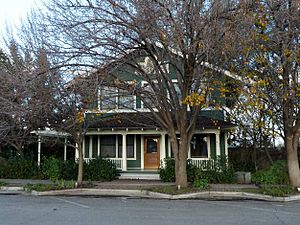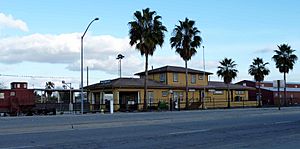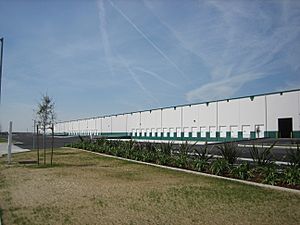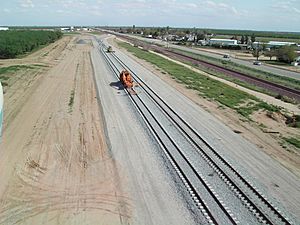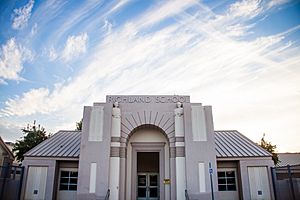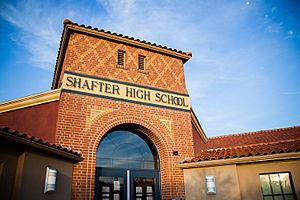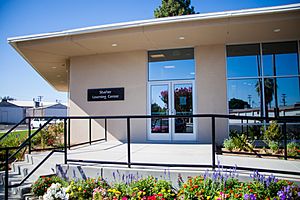Shafter, California facts for kids
Quick facts for kids
Shafter, California
|
||
|---|---|---|
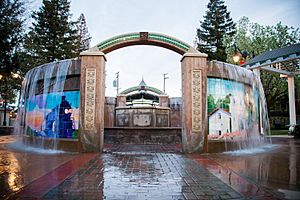
Fountain in downtown Shafter
|
||
|
||
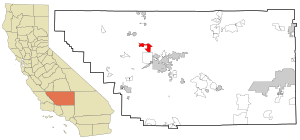
Location in Kern County and the state of California
|
||
| Country | United States | |
| State | California | |
| County | Kern | |
| Incorporated | January 20, 1938 | |
| Named for | William Rufus Shafter | |
| Area | ||
| • Total | 38.72 sq mi (100.29 km2) | |
| • Land | 38.72 sq mi (100.29 km2) | |
| • Water | 0.00 sq mi (0.00 km2) 0% | |
| Elevation | 348 ft (106 m) | |
| Population
(2020)
|
||
| • Total | 19,953 | |
| • Density | 515.32/sq mi (198.953/km2) | |
| Time zone | UTC-8 (PST) | |
| • Summer (DST) | UTC-7 (PDT) | |
| ZIP code |
93263
|
|
| Area code | 661 | |
| FIPS code | 06-71106 | |
| GNIS feature IDs | 1661428, 2411873 | |
| Website | www.shafter.com | |
Shafter is a city in Kern County, California, United States. It is about 18 miles (29 km) west-northwest of Bakersfield. In 2010, about 16,988 people lived there. This was more than the 12,736 people who lived there in 2000. The city is located along State Route 43. Some areas near Shafter include Myricks Corner, North Shafter, Smith Corner, and Thomas Lane.
Contents
History of Shafter
The city of Shafter started as a place where trains could load goods. It was along the Santa Fe Railroad line. The community was named after General William Rufus Shafter. He led U.S. forces in Cuba during the Spanish–American War. People started buying land here in 1914. Shafter officially became a city on January 11, 1938.
The first post office opened in 1898. It moved in 1902 and then closed in 1905. A new postal service began in 1914.
Minter Field: A Historic Airport
Shafter is home to Minter Field. This airport started in June 1941 and was very busy during World War II. About 7,000 soldiers were stationed there. It also held up to 600 prisoners of war. Today, Minter Field is owned by the Minter Field Airport District. It is used as an industrial area and an airport for crop dusters and private planes. There is also a Minter Field Museum at the airport.
The Gossamer Condor's Flight
The first successful human-powered airplane, the Gossamer Condor, made history at Minter Field. On August 23, 1977, Bryan Allen piloted this plane. He won the Kremer prize by flying the plane along a one-mile figure-eight course. The course had two 10-foot high obstacles. The plane was designed by Paul MacCready. A special monument in California marks this important event at the field.
Shafter's Local Museums
The Shafter Historical Society takes care of two other museums. The Green Hotel and the Shafter Depot Museum show what daily life was like for people in Shafter in the past. Both buildings are listed on the National Register of Historic Places.
Celebrating Shafter's History
In 2013, Shafter celebrated its 100th birthday. The Centennial Celebration had many events that showed off the town's history. One event included a PT-13 Training Plane flying over. This type of plane was used at Minter Field during World War II.
Geography and Climate
Shafter covers a total area of about 27.9 square miles (72.3 km2). All of this area is land.
Shafter's Weather
Shafter has a warm climate. Here's a quick look at the weather:
| Climate data for Shafter, California | |||||||||||||
|---|---|---|---|---|---|---|---|---|---|---|---|---|---|
| Month | Jan | Feb | Mar | Apr | May | Jun | Jul | Aug | Sep | Oct | Nov | Dec | Year |
| Record high °F (°C) | 81.0 (27.2) |
86.0 (30.0) |
93.0 (33.9) |
101.0 (38.3) |
109.0 (42.8) |
113.0 (45.0) |
115.0 (46.1) |
113.0 (45.0) |
111.0 (43.9) |
105.0 (40.6) |
92.0 (33.3) |
81.0 (27.2) |
115.0 (46.1) |
| Mean daily maximum °F (°C) | 57.0 (13.9) |
65.0 (18.3) |
70.0 (21.1) |
78.0 (25.6) |
87.0 (30.6) |
94.0 (34.4) |
99.0 (37.2) |
98.0 (36.7) |
92.0 (33.3) |
82.0 (27.8) |
67.0 (19.4) |
57.0 (13.9) |
78.8 (26.0) |
| Mean daily minimum °F (°C) | 37.0 (2.8) |
40.0 (4.4) |
43.0 (6.1) |
47.0 (8.3) |
53.0 (11.7) |
59.0 (15.0) |
63.0 (17.2) |
62.0 (16.7) |
58.0 (14.4) |
49.0 (9.4) |
40.0 (4.4) |
34.0 (1.1) |
48.8 (9.3) |
| Record low °F (°C) | 19.0 (−7.2) |
22.0 (−5.6) |
26.0 (−3.3) |
31.0 (−0.6) |
39.0 (3.9) |
43.0 (6.1) |
49.0 (9.4) |
46.0 (7.8) |
41.0 (5.0) |
29.0 (−1.7) |
21.0 (−6.1) |
14.0 (−10.0) |
14.0 (−10.0) |
| Average precipitation inches (mm) | 1.34 (34) |
1.37 (35) |
1.60 (41) |
0.58 (15) |
0.24 (6.1) |
0.13 (3.3) |
0.01 (0.25) |
0.03 (0.76) |
0.18 (4.6) |
0.34 (8.6) |
0.64 (16) |
0.88 (22) |
7.34 (186.61) |
| Source: The Weather Channel | |||||||||||||
Shafter's Population and People
| Historical population | |||
|---|---|---|---|
| Census | Pop. | %± | |
| 1940 | 1,258 | — | |
| 1950 | 2,207 | 75.4% | |
| 1960 | 4,576 | 107.3% | |
| 1970 | 5,327 | 16.4% | |
| 1980 | 7,010 | 31.6% | |
| 1990 | 8,409 | 20.0% | |
| 2000 | 12,736 | 51.5% | |
| 2010 | 16,988 | 33.4% | |
| 2019 (est.) | 20,401 | 20.1% | |
| U.S. Decennial Census | |||
In 2010, Shafter had 16,988 people. Most people lived in homes, while a small number were in group living situations or institutions.
Many families in Shafter have children under 18. The average household had about 3.86 people. The average family had about 4.11 people.
The median age in Shafter was 25.9 years. This means half the people were younger than 25.9 and half were older. For every 100 females, there were about 105.6 males.
Shafter's Economy and Jobs
Historically, Shafter's economy has been mostly about farming and related businesses. Farmers in the area grow crops like almonds, pistachios, cotton, grapes, and alfalfa. They also grow some carrots, potatoes, and other vegetables. Cotton and potatoes have been very important to Shafter's growth over the years.
Today, Shafter is also a center for other types of businesses. These include manufacturing (making things), logistics (moving goods), and energy.
Here are some companies that have set up in Shafter:
| Company | Year Established in Shafter |
|---|---|
| Amazon Fulfillment Center | 2022 |
| Ross Dress for Less | 2015 |
| FedEx Ground | 2015 |
| Target | 2002 |
| Richland School District | 1914 |
| Baker Hughes | 2012 |
| City of Shafter | 1913 |
| Kern High School District | 1928 (Shafter High Founded) |
| MI Swaco/Schulmberger | 2012 |
| Williams-Sonoma | 2008 |
| The Garlic Company | 1986 |
| Global Fabricators | 2005 |
| Bidart Brothers | 1993 |
| Performance Food Group | 2005 |
| California Paper | 2013 |
| Cemex | 2008 |
| GAF | 1993 |
| Weatherford | 2012 |
| American Tire Distributors | 2007 |
| State Farm | 2001 |
| The Hillman Group | 2000 |
| GMC Roofing | 2002 |
| Grimmway Enterprises | |
| JD Rush | |
| Richland Chevrolet Co. | 1947 |
Shafter's Rail Facility
Shafter has its own Rail Facility with over 10,000 feet (3,048 meters) of train tracks. The city owns these tracks, and its Public Works Department operates them. This facility connects the BNSF Railway to businesses in the Paramount Logistics Park. This park is the only industrial area in the San Joaquin Valley that has its own rail connection. The Paramount Logistics Park helps businesses in the Central Valley send goods to ports in Long Beach and Los Angeles. For example, Ross Dress for Less moved into the park in 2013.
American Tire Distributors also signed a long lease to use over 1 million square feet of space for distribution. They started using part of the space in 2014.
Shafter's Fiber-Optic Network
In 2006, Shafter started building a 25-mile fiber-optic network. This network, called Shafter Connect, provides very fast internet speeds (10 Gbit/s Ethernet). It has been very reliable since it started in 2007. The network can even support faster speeds as technology improves.
The network currently serves several parts of the city, including:
- Downtown city buildings, schools, and police facilities.
- The Minter Field Airport and industrial area near Highway 99.
- The Paramount Logistics Park.
- New homes and businesses being built.
Shafter is the only city in the Central Valley that offers fiber-optic connections like this.
Education in Shafter
Shafter is home to the Richland School District. This district manages four schools: Golden Oak Elementary School (Kindergarten-6th grade), Redwood Elementary School (Kindergarten-6th grade), Sequoia Elementary School (Kindergarten-6th grade), and Richland Junior High School. The district has small class sizes, especially for younger students. They also have libraries, a marching band, and programs for gifted students.
Richland Schools do well in academic competitions. These include Math Field Day, History Day, and the Oral Language Festival. Math has been a strong subject for Richland Schools. In 2014, a teacher from Sequoia Elementary was named the regional GATE Teacher of the Year.
Shafter also has Shafter High School, which is part of the Kern High School District. The school was built in the late 1920s and officially started in 1928. Shafter High School has been updated with new buildings, including a new cafeteria and classrooms. It also has the Fred L. Starrh Performing Arts Center, a large theater.
Kern Adventist Elementary is another school in Shafter. It is a small Christian school with one teacher and has been open for over 92 years.
Shafter Education Partnership
In 2010, the City of Shafter, the Richland School District, and Shafter High School created the Shafter Education Partnership. The city helps fund this partnership. Its main goal is to help children build a strong foundation in reading. They give books to children, and offer summer and after-school reading programs.
Shafter Learning Center
The Shafter Education Partnership, along with the Kern County Library and Richland School District, opened the Shafter Learning Center in June 2014. The building was updated to include classrooms and a computer lab. The center offers classes for students in subjects like math, keyboarding, art, science, reading, and languages. In 2021, the Kern County Shafter Library Branch closed. In response, the City of Shafter opened a new city library in the same building, working with Bakersfield College.
City Government and Leaders
Shafter is led by a mayor and other city officials. Here is a list of some of the mayors who have served Shafter:
| Mayors Name | Years in Office |
|---|---|
| Phil Ohanneson | 1938-1942 |
| William Bill Lachenmaier | 1942-1944 |
| Joe W. Frizzell | 1946-1948 |
| P.V. McClure | 1948-1950 |
| Adolf Kirschenmann | 1950-1958 |
| G.H. Ben Grundy | 1958-1962 |
| Harvey Gaede | 1962-1964 |
| Anthony B. Brown | 1964-1964 |
| Allen L. Zenk | 1964-1968 |
| J.C. Jay Atkinson | 1968-1970 |
| Wilmer Bill Hildebrand | 1970-1972 |
| Richard Larson | 1972-1976 |
| Elmer Unruh | 1978-1982 |
| Loyd Link | 1982-1984 |
| Donald Zachary | 1984-1988 |
| Cathy Prout | 1988-1992 |
| Linda Gragg | 1992-1996 |
| Garry Nelson | 1996-2002 |
| Fran Florez | 2002-2006 |
| Cathy Prout | 2006-2010 |
| Garry Nelson | 2010-2012 |
| Jon W. Johnston | 2013-2014 |
| Cathy Prout | 2014-2019 |
| Gilbert Alvarado | 2019-2020 |
| Cathy Prout | 2020-2022 |
| Chad Givens | 2022–present |
Famous People from Shafter
- Dean Florez – A state senator in California.
- Annette Funicello – An actress, singer, and Mouseketeer. She lived in Shafter for two years.
- Anna Jelmini – A track and field athlete.
- Larsen Jensen – An Olympic medalist in swimming.
- Joe O'Brien – A famous Harness racing driver.
- Jerry Quarry – A heavyweight boxing contender. He was born in nearby Bakersfield and is buried in Shafter.
See also
 In Spanish: Shafter (California) para niños
In Spanish: Shafter (California) para niños
 | May Edward Chinn |
 | Rebecca Cole |
 | Alexa Canady |
 | Dorothy Lavinia Brown |




